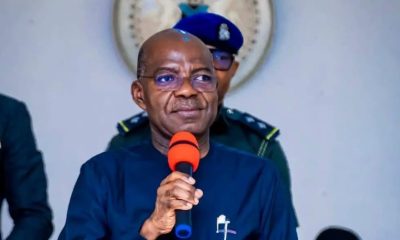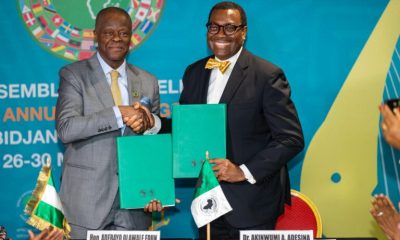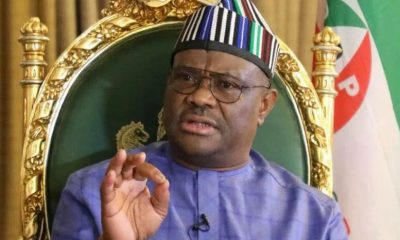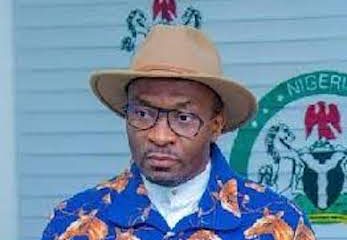Economy
Providence, Good Policies as Drivers of Nigeria’s Unicorns

By Chijioke Okoronkwo
The COVID-19 lockdown of 2020 caused market disruptions, fast-tracked digital migration of businesses and triggered significant growth in the number of unicorns globally.
In the capital industry, a unicorn is private startup company that is valued at over one billion dollars.
Available statistics indicate that almost 40 per cent of current unicorns around the world were created in the first eight months of 2021.
The statistics also showed that fintechs and internet software and services produced the highest number of unicorns.
In Nigeria, as recently cited by Vice President Yemi Osinbajo, six startups owned by young Nigerians attained the status of unicorns between 2016 and 2021.
Osinbajo made this closure in his address at the Graduation Ceremony of Senior Executive Course 43, 2021 of the National Institute for Policy and Strategic Studies (NIPSS), Kuru, Jos.
Osinbajo attributed the feat of the startups to providence and good policies.
“Six of those companies started between 2016 in the middle of two recessions and global health crisis.
“The companies are: Opay, Paystack, Flutterwave, Andela, PiggyVest and Jumia.
“Paystack was co-founded in 2016 by two graduates of Babcock University, in their twenties.
“Paystack is a payment processing company; I am sure many have heard that it was eventually bought over by Stripe, the American multinational; it is now estimated to be worth a billion dollars.
“Flutterwave, also a payment processing company, founded in 2016 in Lagos; it is now worth nearly three billion dollars and both companies employ hundreds of young men and women.’’
He said that PiggyVest was co- founded in 2016 by ex-students of Covenant University, led by 21-year-old lady.
According to him, PiggyVest is a wealth management platform that at the end of 2019, had helped one million users save about 80 million dollars.
“What is responsible for some of these successes? Providence and good policies.
“Providence because COVID-19 was a boom period for online payment systems.
“Policy because the President approved the establishment of a technology and creativity advisory group that helped to formulate new banking policies to accommodate new tech enabled payment systems, such that these tech companies could process payments without being full scale banks.
“The Central Bank of Nigeria (CBN) was then able to issue new types of licences for payment processing; the Federal Government has established a N75 billion National Youth Investment Fund.
“This provides financial support for small businesses in any field.”
The vice president said that CBN had also established a Creative Sector Fund for young people in entertainment or technology.
He said there was also new programme called Investing in Digital and Creative Enterprises (iDICE).
According to Osinbajo, iDICE is an over 600 million dollars programme that will support young tech and creative sector entrepreneurs through the provision of finance, skills development and infrastructure.
“Earlier this year, the Federal Government partnered the UNDP and the private sector to start a programme called the Jubilee Fellows Internship Programme.
“For the next five years, every year, 20,000 students after youth service will be given internship opportunities in private sector companies and in public agencies.
“The idea will be for the participants to gain relevant career and life skills that will enable them transit seamlessly into professional, business or public sector careers, while also earning very good pay during the internship.
“These snapshots of possibility are enough to show us that we are not facing an uncertain future without any tools at our disposal.”
The vice president said, however, that if Nigeria was to inaugurate a new age of accelerated growth, it must adopt a new strategic direction and policy orientation.
Osinbajo said that adoption of a new strategy was what the Federal Government sought to do through the National Development Plan 2021-2025 which was recently approved by the Federal Executive Council.
“ In terms of strategic direction, the cornerstone of our strategy is boosting productivity by focusing on value addition as the guiding principle for all sectors, especially agriculture, manufacturing, solid minerals, digital services, tourism, hospitality and entertainment.
“ In agriculture, for example, just as we seek to increase production of rice, we are paying equal attention to other parts of the value chain such as storage, transportation, processing and marketing,” he said.
Just recently, also, the vice president espoused his belief on startups and the contributions to digital economy in Africa.
Osinbajo spoke in Abuja at the 10th-anniversary dinner of AfriLabs – a network organisation, supporting innovation centres across African countries since 2011.
He said that in Nigeria, considerable progress had been made in supporting innovation by the enactment of the Nigerian Startup Act.
The vice president said that African startups were struggling as at 2015, but had leapfrogged the hurdles and got listed as unicorns.
“In 2015, African startups struggled to raise about 200 million dollars, but in 2021 we have more than six unicorns.
“In FinTech alone, we have Flutterwave, Paystack, Opay, and Interswitch, all valued at more than one billion dollars each.
“In e-commerce, we have Jumia, Ashraf Sabry’s Fawbry, an Egyptian e-payment company that allows customers to settle bills online and digitally, and is now on the Egyptian stock exchange with about 30 million customers.
“MNT-Halan, Egypt’s largest lender to the unbanked has about one million monthly active users and has disbursed $1.7billon in loans to date.
“Tala, a startup in Kenya that helps the traditionally underbanked borrow, save, and grow their money has expanded to India, the Philippines, and Mexico and has disbursed close to $3billion of credit, and has more than six million customers.
“And here in Nigeria, we have Piggyvest, a wealth management platform that at the end of 2019, had helped about one million users save about 80 million dollars.
“ And in Senegal, Wave, a mobile money provider that became Francophone Africa’s first unicorn when it received a $200million injection of funds.”
Osinbajo said that while Africa’s fintech unicorns were payments-focused today, in the future we can expect more variety; digital lenders and insurers. Invest-tech and blockchain are also likely to feature.
“Of course, we should also expect unicorns to emerge in other sectors—companies that will help to address the continent’s key challenges in relation to healthcare, schooling, trade, and so on.”
Osinbajo called on stakeholders, especially governments across the continent to support the revolution taking place in the sector.
According to him, much of the growth of African startups has been organic–mostly operating as individual enterprises or at best as city initiatives.
He said, however, that national effort was still usually missing.
“There is now a need for positive action, proactive and intentional policies by governments to create the environment for startups and technology-based enterprises to thrive.”
Evidentially, the efforts to encourage Nigeria’s fintech and grow more unicorns are multisectoral.
The Financial Technology Association of Nigeria (FinTechNGR) lately, in a bid to bolster fintechs, started targeting one million students and other individuals over the next five years.
The President of the association, Mr Ade Bajomo, said that the association would develop digital talents in university students, hence, its unveiling of the “DigiStuds Programme.”
He said that the programme was aimed at developing technical expertise among the students, so as to ensure their employability in the Nigerian fintech ecosystem.
”The target is to reach a million students, individuals, over the next five years, and we have started with a handful of universities to put a process in place that is robust and repeatable and, then, we can expand on it.
”Nigeria retains her place as one of the top four fintech hubs in Africa alongside Kenya, South Africa and Egypt.
“Already, Nigerian fintech startups have raised over 321 million dollars in 47 deals as at half year 2021, compared with 307 million dollars raised in 2020.
”We are proud that Nigeria is also one of the 38 countries that have produced unicorns, such as Interswitch, Flutterwave, Jumia, Airtel Africa, OPay and, most recently, Andella.
”Innovation has not been restricted to fintech alone, as we are seeing regulators such as the CBN introduce a digital currency `eNaira’ into the economy,” he said.
With the increasing web of digital activities and burgeoning fintech sector and enabling policies, perceptive observers say, more Nigerian firms will, in no distant time, be listed as unicorns.
Chidi Anselm Odinkalu is of the News Agency of Nigeria (NAN).
Economy
We’ll Continue Borrowing Within Sustainable Limits- FG

The Federal Government says it will continue to borrow within manageable and sustainable limits in accordance with the Debt Management Office (DMO) debt sustainability framework.
This is contained in a statement by the Director, Information and Public Relations in the Ministry of Finance, Mr Mohammed Manga, in Abuja on Wednesday.
President Bola Tinubu recently requested the approval of the 2024 – 2026 external borrowing rolling plan from the National Assembly.
Tinubu has requested the National Assembly’s approval to secure external loans of 21.5 million dollars and 15 billion Yuan, along with a grant of 65 million Euro, as part of the federal government’s proposed 2025–2026 external borrowing plan.
Manga said that the proposed borrowing plan was an essential component of the Medium-Term Expenditure Framework (MTEF) in accordance with both the Fiscal Responsibility Act 2007 and the DMO Act 2003.
“The plan outlines the external borrowing framework for both the federal and sub-national governments over a three-year period, accompanied by five detailed appendices on the projects, terms and conditions, implementation period, etc.
“By adopting a structured, forward-looking approach, the plan facilitates comprehensive financial planning and avoids the inefficiencies of ad-hoc or reactive borrowing practices.
“This strategic method enhances the country’s ability to implement effective fiscal policies and mobilise development resources,” he said.
According to the statement, the borrowing plan does not equate to actual borrowing for the period.
“The actual borrowing for each year is contained in the annual budget. In 2025, the external borrowing component is 1.23 billion dollars, and it has not yet been drawn.
“This is planned for H2 2025, the plan is for both federal and several state governments across numerous geopolitical zones including Abia, Bauchi, Borno, Gombe, Kaduna, Lagos, Niger, Oyo, Sokoto, and Yobe States.
“Importantly, it should be noted that the borrowing rolling plan does not equate to an automatic increase in the nation’s debt burden.
“The nature of the rolling plan means that borrowings are split over the period of the projects, for example, a large proportion of projects in the 2024–2026 rolling plan have multi-year drawdowns of between five to seven years which are project-tied loans,” Manga said.
He said that these projects cut across critical sectors of the economy, including power grids and transmission lines, irrigation for improving food security, fibre optics network across the country, fighter jets for security, rail and road infrastructure.
According to him, the majority of the proposed borrowing will be sourced from the country’s development partners, like the World Bank, African Development Bank, French Development Agency, European Investment Bank, JICA, China EximBank, and the Islamic Development Bank.
Manga said that these institutions offer concessional financing with favourable terms and long repayment periods, thereby supporting Nigeria’s development objectives sustainably.
He said that the government seeks to reiterate that the debt service to revenue ratio has started decreasing from its peak of over 90 per cent in 2023.
Manga said that the government has ended the distortionary and inflationary ways and means.
According to him, there is significant revenue expectations from the Nigerian National Petroleum Corporation Limited (NNPC Ltd), technology-enabled monitoring and collection of surpluses from government owned enterprises and revenue-generating ministries, departments, and agencies and legacy outstanding dues.
“Having achieved a fair degree of macroeconomic stabilisation, the overarching goal of the federal government is to pivot the economy onto a path of rapid, sustained, and inclusive economic growth.
“Achieving this vision requires substantial investment in critical sectors such as transportation, energy, infrastructure, and agriculture.
“These investments will lay the groundwork for long-term economic diversification and encourage private sector participation.
“Our debt strategy is therefore guided not solely by the size of our obligations, but by the utility, sustainability, and economic returns of the borrowing,” he said.(NAN)
The Federal Government says it will continue to borrow within manageable and sustainable limits in accordance with the Debt Management Office (DMO) debt sustainability framework.
This is contained in a statement by the Director, Information and Public Relations in the Ministry of Finance, Mr Mohammed Manga, in Abuja on Wednesday.
President Bola Tinubu recently requested the approval of the 2024 – 2026 external borrowing rolling plan from the National Assembly.
Tinubu has requested the National Assembly’s approval to secure external loans of 21.5 million dollars and 15 billion Yuan, along with a grant of 65 million Euro, as part of the federal government’s proposed 2025–2026 external borrowing plan.
Manga said that the proposed borrowing plan was an essential component of the Medium-Term Expenditure Framework (MTEF) in accordance with both the Fiscal Responsibility Act 2007 and the DMO Act 2003.
“The plan outlines the external borrowing framework for both the federal and sub-national governments over a three-year period, accompanied by five detailed appendices on the projects, terms and conditions, implementation period, etc.
“By adopting a structured, forward-looking approach, the plan facilitates comprehensive financial planning and avoids the inefficiencies of ad-hoc or reactive borrowing practices.
“This strategic method enhances the country’s ability to implement effective fiscal policies and mobilise development resources,” he said.
According to the statement, the borrowing plan does not equate to actual borrowing for the period.
“The actual borrowing for each year is contained in the annual budget. In 2025, the external borrowing component is 1.23 billion dollars, and it has not yet been drawn.
“This is planned for H2 2025, the plan is for both federal and several state governments across numerous geopolitical zones including Abia, Bauchi, Borno, Gombe, Kaduna, Lagos, Niger, Oyo, Sokoto, and Yobe States.
“Importantly, it should be noted that the borrowing rolling plan does not equate to an automatic increase in the nation’s debt burden.
“The nature of the rolling plan means that borrowings are split over the period of the projects, for example, a large proportion of projects in the 2024–2026 rolling plan have multi-year drawdowns of between five to seven years which are project-tied loans,” Manga said.
He said that these projects cut across critical sectors of the economy, including power grids and transmission lines, irrigation for improving food security, fibre optics network across the country, fighter jets for security, rail and road infrastructure.
According to him, the majority of the proposed borrowing will be sourced from the country’s development partners, like the World Bank, African Development Bank, French Development Agency, European Investment Bank, JICA, China EximBank, and the Islamic Development Bank.
Manga said that these institutions offer concessional financing with favourable terms and long repayment periods, thereby supporting Nigeria’s development objectives sustainably.
He said that the government seeks to reiterate that the debt service to revenue ratio has started decreasing from its peak of over 90 per cent in 2023.
Manga said that the government has ended the distortionary and inflationary ways and means.
According to him, there is significant revenue expectations from the Nigerian National Petroleum Corporation Limited (NNPC Ltd), technology-enabled monitoring and collection of surpluses from government owned enterprises and revenue-generating ministries, departments, and agencies and legacy outstanding dues.
“Having achieved a fair degree of macroeconomic stabilisation, the overarching goal of the federal government is to pivot the economy onto a path of rapid, sustained, and inclusive economic growth.
“Achieving this vision requires substantial investment in critical sectors such as transportation, energy, infrastructure, and agriculture.
“These investments will lay the groundwork for long-term economic diversification and encourage private sector participation.
“Our debt strategy is therefore guided not solely by the size of our obligations, but by the utility, sustainability, and economic returns of the borrowing,” he said.(NAN)
Economy
Organise Informal Sector, Tax Prosperity Not Poverty, Adedeji Tasks Officials

The Chairman, Joint Tax Board (JTB), Dr Zacch Adedeji, has urged officials of the board to organise traders and artisans into a formal body before capturing them in the tax net.
Adedeji said that this was in line with the agenda of President Bola Tinubu not to tax poverty but prosperity.
The chairman stated this at the 157th Joint Tax Board meeting held in Ibadan, on Monday.
The theme of the meeting “Taxation of the Informal Sector: Potentials and Challenges”.
Speaking on the theme of the event, Adedeji stressed the need to evolve a system that would make the informal sector formal before it could be taxed.
Adedeji, who also doubles as the Chairman, Federal Inland Revenue Service, (FIRS), said “What I would not expect from the JTB meeting is to define a system that would tax the informal sector.
“The only thing is to formalize the informal sector, not to design a system on how to collect tax from market men and women.
“As revenue administrator, our goal is to organise the informal sector so that it can fit into existing tax law.”
Citing a report of the National Bureau of Statistics (NBS) in the first quarter of 2023, the chairman said that the nation’s unemployment index was attributable to recognised informal work.
Adedeji stated that workers in that sector accounted for 92.6 per cent of the employed population in the country as at Q1 2023.
“JTB IS transiting to the Joint Revenue Board with expanded scope and functions.
“We are hopeful that by the time we hold the next meeting of the Board, the Joint Revenue Board (Establishment) Bill would have been signed into Law by the President.
“The meetings of the board provide the platform for members to engage and brainstorm on contemporary and emerging issues on tax, and taxation,” he said.
In his address, Gov. Seyi Makinde of Oyo State, said the theme of the meeting was apt and timely, stressing that it coincides with the agenda of the state to improve on its internally generated revenue.
According to him, the meeting should find the best way forward in addressing the issue of the informal sector and balance the identified challenges.
“Nigeria is rich in natural resources, but it is a poor country because economic prosperity does not base on natural resources,”
Makinde also said that knowledge, skill and intensive production were required for economic prosperity, not just the availability of natural resources.
He stressed the need to move from expecting Federal Allocations to generating income internally.
“We are actively ensuring that people are productive and moving the revenue base forward,” Makinde said.
The governor said that tax drive should be done by simplifying tax processes, incentives for compliance like access to empowerment schemes and loans.
He urged JTB to deepen partnership and innovation in using data on tax to track and administer it.
Earlier, the Executive Chairman, Oyo State Board of Internal Revenue, Mr Olufemi Awakan, said the meeting was to address tax-related matters, evolve a workable, effective and
efficient tax system across the states and at the Federal level.
He urged participants to find amicable solutions to challenges of tax jurisdiction, among others.
Tax administrators from all the 36 states of the federation, who are members of JTB, were in attendance. (NAN)
Economy
Customs Zone D Seizes Contraband Worth N110m

The Nigeria Customs Service (NCS), Federal Operation Unit (FOU), Zone D, has seized smuggled goods worth over N110 million between April 20 till date.
The Comptroller of Customs, Abubakar Umar, said this at a news conference on Tuesday in Bauchi.
He listed the seized items to include 11,200 litres of petrol; 192 bales of second hand clothing, 140 cartons of pasta, 125 pairs of jungle boots, 47 bags of foreign parboiled rice and 9.
40 kilogramme of pangolin scales.Umar said the items were seized through increased patrols, intelligence-led operations, and strengthened inter-agency collaboration.
The comptroller said the pangolin scales would be handed over to the National Environmental Standards and Regulations Enforcement Agency (NESREA) for appropriate action, while the seized petrol would be auctioned, and the proceeds remitted to the federation account.
He attributed the decrease in smuggling activities of wildlife, narcotics, and fuel to the dedication and professionalism displayed by the personnel in line with Sections 226 and 245 of the NCS Act 2023.
The comptroller enjoined traders to remain law abiding, adding the service would scale up sensitisation activities to combat smuggling.
“We remain resolute in securing the borders and contributing to Nigeria’s economic development,” he said.
The FOU Zone D comprises Adamawa; Taraba, Bauchi, Gombe, Borno, Yobe, Plateau, Benue and Nasarawa. (NAN)





















